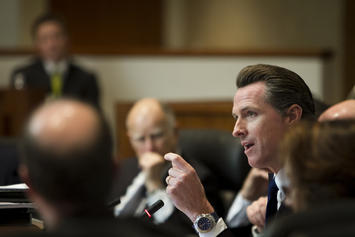
A youthful and handsome appearance, the blessings of the autocrats and clerics of our times, and a fawning media — all these belonged to French President Emmanuel Macron just a year ago. He was praised as everything from the “new leader of the Free World” to Europe’s Reagan.
Today Macron’s presidency is adrift, paralyzed by grassroots opposition to his policies — mostly from the middle and working classes — and a popularity rating about half of that suffered by Donald Trump. Is this the fate that awaits our new governor, Gavin Newsom?
There are many similarities between the two. Macron was nurtured by the investment bankers he once worked for, while Newsom’s finances have been in large part the gift of the descendants of the Getty oil fortune. Both sold themselves as creators of a bright future that would leave their constituents both more enlightened and prosperous.
Reality strikes
In many ways, Macron came into office worse off than Newsom. Although he also enjoyed an overwhelming personal mandate and a huge majority in the National Assembly, he inherited a weak economy. French unemployment remains high and conditions for all but the rich have markedly deteriorated. When Macron tried to impose new fuel taxes to boost his climate street cred, the middle and working classes of the country exploded.
In contrast Newsom benefits from an economy intimately tied to the tech sector and has enjoyed a real estate boom. Despite higher spending, these have helped keep the state’s annual budget in impressive shape.
Yet as Jerry Brown himself admits, there is a growing chance of a recession in the state that could upset the balance sheet. The state’s economy is no longer substantially outpacing the country and now lags well behind in job creation to such key competitors as Nevada, Arizona, Texas, Florida and Washington. At the same time companies with lots of middle-class jobs — most recently Foremost McKesson — continue to leave the state at an accelerated rate.
Changes that are coming
In many ways, Newsom suffers from bad timing. Brown’s governorship was in part rescued by the post-Afghanistan military buildup, and then by a digital gold rush that injected billions into the state coffers. At the same California’s coastal areas were well-positioned for real estate investment both from institutions and abroad, largely China.
Now these conditions may be shifting. The real estate boom has clearly peaked, particularly at the luxury end of the market. Rents are now so high that fewer people can afford homes, with both tech and entertainment workers increasingly forced to live in their cars. The key speculative markets in places such as downtown Los Angeles and the luxury communities of Southern California seem to have topped out.
Finally, there is trouble brewing in tech-world. Stock prices for major firms have driven the recovery, but now tech, most notably social media firms, has fallen. Tech is now growing far faster in other parts of the country, notably Orlando, Austin, Salt Lake and Phoenix, than in either San Francisco or Los Angeles. Only the prospect of new tech IPOs may keep the state’s budget from busting.
Will Californians ever stand up?
The Newsom era begins with ever-greater political unanimity, which will make it harder, as Brown himself has suggested, stopping the Legislature from raising taxes and imposing ever more draconian regulations. Instead we can expect a rapid ramping-up of policies certain to drive up the price of energy and taxes while making housing production, notably single-family homes, all but impossible.
Newsom’s vainglorious promises about building 3.5 million new residences by 2025 may be one he might regret and likely won’t fulfill. Under the current circumstances, and state policies, housing can only be built in places where prices tend to be highest and most of the new housing is expensive small family-unfriendly apartments.
The state’s free-spending regime could become particularly toxic if the economy continues to slow. No doubt the state and national media will blame this on Trump. But Newsom is inheriting many largely self-inflicted crises — the decline of blue-collar jobs, declining infrastructure absurd housing prices, massive poverty and the embarrassing budget-busting high-speed choo-choo.
The national media may see us as a blue state paradise, but most Californians express concern about future economic conditions, particularly for the next generation. What Californians lack is the French skill of knowing when they are being crushed by the well-heeled ruling class and their political running dogs. With any potential political opposition all but dead, and the state GOP something of a joke, any protests will have to start at the grassroots level, as happened with the gilets jaunes in France.
To achieve the changes secured by their French counterparts, middle- and working-class Californians need to rediscover their repressed insurrectionary, defiant spirit. “Happy the nation whose people have not forgotten how to rebel,” noted historian British R.H. Tawney. This is an idea Californians need to embrace if they wish to see something other than a feudal future for the next generation.
This piece originally appeared on The Orange County Register.
Joel Kotkin is executive editor of NewGeography.com. He is the Roger Hobbs Distinguished Fellow in Urban Studies at Chapman University and executive director of the Houston-based Center for Opportunity Urbanism. His newest book is The Human City: Urbanism for the rest of us. He is also author of The New Class Conflict, The City: A Global History, and The Next Hundred Million: America in 2050. He lives in Orange County, CA.
Photo: Charlie Kaijo, via Flickr, using CC License.












